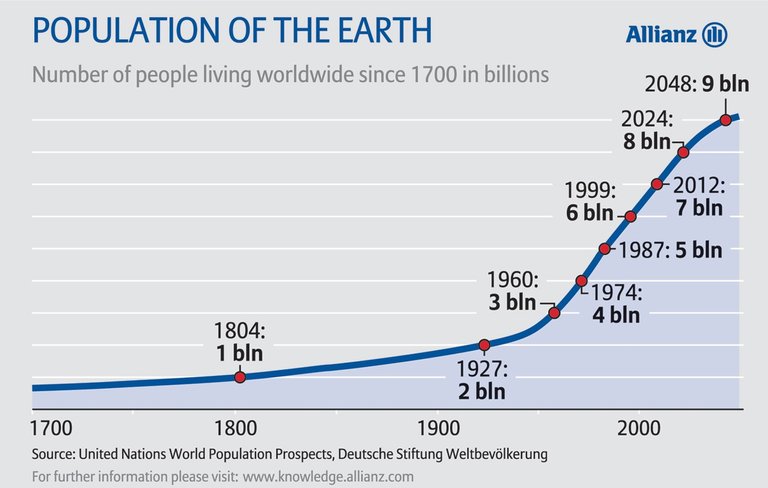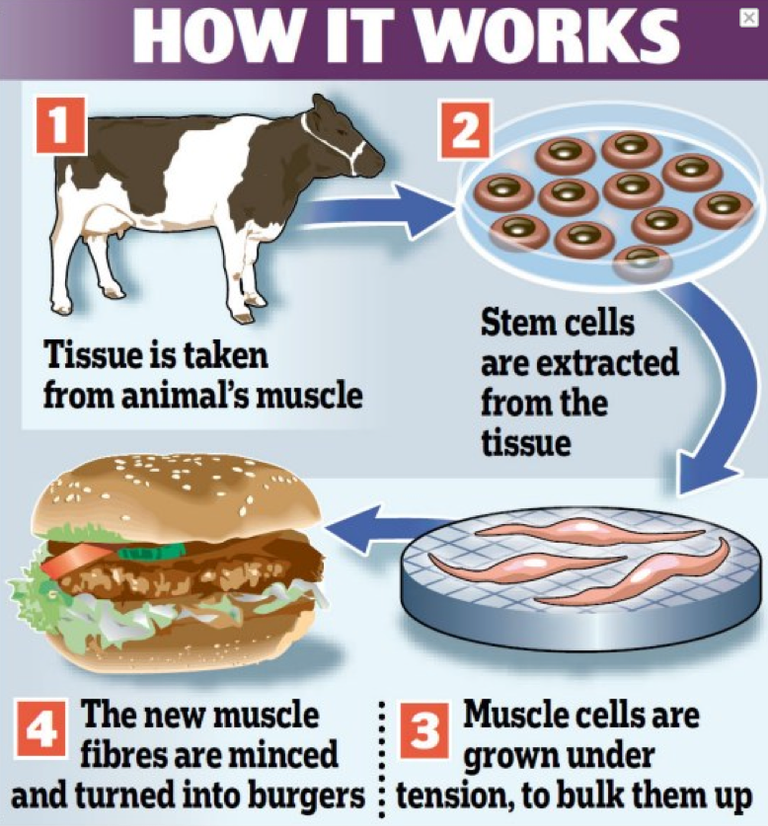Few topics will be of greater importance over the coming decades than sustainability and the explosive growth of the human population. Having seen a doubling of population since the 1970's, few would argue that the human population is growing at an alarming rate. With that population growth comes a number of other issues: food shortages, water shortages, pollution, disease etc. etc. While these issues are undoubtedly potentially dangerous, and certainly alarming, the world is not only doom and gloom. Technological advancement, as well as human understanding of the world, is growing day by day.

The Issue
The issue I will discuss in this post is the enormously wasteful, dangerous, and damaging (both to the environment and to human health) meat industry. As mentioned above, the human population is growing at alarming rate. The United Nations estimates that by 2050, the population will have grown by another 2 billion people. Considering current rates of production efficiency and consumption, food production will have to rise by 70% to keep up. Source

If you look at the way the meat industry functions today, that is simply not sustainable. According to a 2006 United Nations report, livestock are responsible for approximately 18% of greenhouse gas emissions when looking at methane produced as well as the insane amount of energy it takes to feed livestock.
Source
The Solution?
A potential long-term solution could be the advent of lab-grown meat. While the best way to cut down on all of the horrendous effects of the meat industry would be to create a global vegetarian society, that simply seems like an unreasonable request. Option B is to find a way to provide meat to consumers that does not require as much energy, water, or create as many emissions: lab grown meat.
Lab grown meat is meat that it is grown out of stem cell cultures using tissue engineering techniques similar to what is used in many forms of regenerative medicine (ie. growing organs or other body parts for medical patients.) The research is being spearheaded by Dr. Mark Post at Maastricht University in the Netherlands, and the first lab grown beef patty was already consumed in a 2013 demonstration. The reaction? According to Hanni Rützler, one of the tasters at the demonstration,
It's close to meat, but its not as juicy, I was expecting the texture to be more soft. The surface was surprisingly crunchy."
Not bad for the first ever lab grown patty!

Advantages
Environmental: Compared to most forms of livestock, cultured meat requires less energy, creates less greenhouse gases, requires less land, and less water. All by significant margins. (see infographic below)
Moral: There is no suffering on the part of the animals being consumed. Conventional forms of meat production frequently place animals in horrible living conditions while simultaneously injecting them with a variety of chemicals to stimulate growth and prevent disease.
Safety: Lab grown meat is far less likely to carry disease since it is grown in a sterile environment. The CDC (Centers for Disease Control and Prevention) estimates that the largest number of food related fatalities come from pathogens found in meat. There is further no need to inject the meat with antibiotics (which is done in the conventional meat industry to fight disease) that have been identified as the source of antibiotic resistant bacteria that are dangerous to humans. Source
Health: Further, red meat is not particularly healthy for the human body. It contains large amounts of saturated fatty acids, cholesterol, heme iron (linked to cancer), and other things. Since the meat is being grown according to a desired outcome, it is possible that those dangerous components could be removed from the meat entirely. Of course, only so much can be removed while still keeping the normal taste of meat, but it does create options. Source

Disadvantages
Cost: As of now, lab grown meat is significantly more expensive to produce than conventional meat. That first beef patty that was consumed in 2013? That cost 330,000 to produce. However, by 2015 the cost had already been cut to just 11 per burger. True, that cost is still quite high compared to what is currently being sold in supermarkets. But considering the positive effects that scaling production would have on the cost, it is not hard to imagine that the cost will continue to fall. Source
The "Ick" Factor: It is not hard to imagine that many people will have an initial "ick" reaction to the idea of meat grown with stem cells, particularly considering the negative connotation stem cells have. However, I believe that to be a short term phenomena and would become less of an issue the longer that lab grown meat existed.
Conclusion
As you might have noticed based on the post, I'm somewhat biased towards the idea of lab grown meat. While I am personally a vegetarian, I know that an entirely vegetarian human population will never exist. However, this seems like the best alternative to me. It significantly reduces the environmental costs of the meat industry, and would also allow for meat to be produced anywhere....significantly cutting negative externalities of the industry such as transportation emissions. I look forward to the day when these products come to market, and to seeing how the public reacts.
Sources
- http://gizmodo.com/the-future-will-be-full-of-lab-grown-meat-1720874704#replies
- http://phys.org/news/2013-08-lab-grown-meat-good.html
- http://pubs.acs.org/doi/abs/10.1021/es200130u
- http://www.takepart.com/feature/2016/05/23/cultured-beef
- https://www.washingtonpost.com/national/health-science/lab-grown-beef-taste-test-almost-like-a-burger/2013/08/05/921a5996-fdf4-11e2-96a8-d3b921c0924a_story.html
- http://www.wired.com/2016/07/lab-grown-meat-coming-win-haters/
- http://www.theatlantic.com/health/archive/2013/08/is-lab-grown-meat-good-for-us/278778/
- https://www.washingtonpost.com/national/health-science/lab-grown-meat-is-in-your-future-and-it-may-be-healthier-than-the-real-stuff/2016/05/02/aa893f34-e630-11e5-a6f3-21ccdbc5f74e_story.html
I personally only buy locally raised meat, mostly from a local farmer who can guarantee his animals are raised properly/organically.
I see the big issue with meat is that of supermarkets/fast food chains driving down cost and increasing volume, which leads to poor practice in the supply chain. Meat should be a luxury but its everywhere and its cheap.
The environmental problem with artificial meat will be the same, the same players will push down costs and increase volumes so the carbon footprint is still bad, and this will fuel even more population explosion.
From an animal welfare perspective, we may see some types of animal go extinct, look what happened to numbers of horses after the motor car became common; cattle and pig dont have other uses.
As always its not the technology thats right/wrong, its how we use it.
Most of future men would eat insects, I am afraid .
Not sure which, lab grown meat, or insects is the more appealing choice. Can't get lab grown meat out my head, can't get insect parts out of my teeth^^
May be I am wrong, but I remember some research about number of cows in a macdonalds hamburger.
200 cows!
Meat in one hamburger was mixed of meat of two hundreds cows!
I was very impressed, but really I don't like fastfood and don't eat it.
We are what we eat (c).
Want long life? Be carefull with food.
At least with the lab grown meat, you could say it came from 1 organism?!
That is my point. There is no difference between macdonalds meat and lab grown meat.
Thank you for the detail post. It could be the answer to mine https://steemit.com/food/@borishaifa/are-yog-ready-to-eat-lab-grown-meat
Thank you for sharing this material, I like what you posted. Thank you so much
This post has been linked to from another place on Steem.
Learn more about linkback bot v0.3
Upvote if you want the bot to continue posting linkbacks for your posts. Flag if otherwise. Built by @ontofractal